A furious Melbourne coach John Northey yells “don’t you ever do that again” at Jim Stynes as players enter the rooms. Photo: WAYNE LUDBEY
Game changer: Finals classic delivers more than just drama
Thirty years later, the story of the 1987 preliminary final is inevitably reduced to one famous moment, Jim Stynes running across the mark, conceding a 15-metre penalty and allowing Gary Buckenara to put Hawthorn into a fifth successive grand final and deny Melbourne a fairytale.
It remains one of the most indelible memories in finals history. Yet this was a game which had an entire catalogue of incidents, most of which would be remembered enough on their own even without one of the most dramatic finishes of all time.
There were heroes that day on both sides. Melbourne captain Robert Flower, playing in his first finals series after 15 seasons of league football, probably wouldn’t have played in the grand final had Buckenara missed.
He’d been crunched by Robert DiPierdomenico, his shoulder damaged. But through necessity, Flower remained stationed in Melbourne’s goal square, his arm hanging limply by his side.
Hawthorn centre half-back Chris Mew was carried off after a heavy knock. That wasn’t the only thing that had gone wrong for the Hawks, who after an untimely wind change, kicked against the breeze for three quarters.
There were the tragic “what ifs” for Melbourne in no fewer than three golden opportunities to seal the game missed, Graeme Yeats and Tony Campbell running into open goals and misfiring, and in between those two “gimmes”, Simon Eishold marking only five metres out on a slight angle then completely shanking his kick.
Hawk defender Paul Abbott, the man on the mark for that infamous shot and an old high school mate of mine, has always claimed credit for Eishold’s miskick. It was a direct result, he said, of the Demon having to stare at his ugly dial.
There was utter confusion and bewilderment as umpire David Howlett paid that fateful 15-metre penalty against Stynes, and controversy even after the game, as Melbourne chairman Stuart Spencer and celebrity supporter Derryn Hinch stormed down to the umpires’ rooms to confront the men in white about that decision.
The visual memories continue to crop up decades later, the footage of Melbourne supporters, having had a famous victory ripped from their grasp, in tears after the siren. Two of the game’s more re-published photographic images also come from that Saturday afternoon.
There’s Wayne Ludbey’s unforgettable snap of furious Melbourne coach John Northey yelling “Don’t you ever do that again” at Stynes as the players entered the rooms. And another poignant shot of two opposing veterans and captains in Flower and Michael Tuck wishing each other luck as Buckenara lined up for goal.
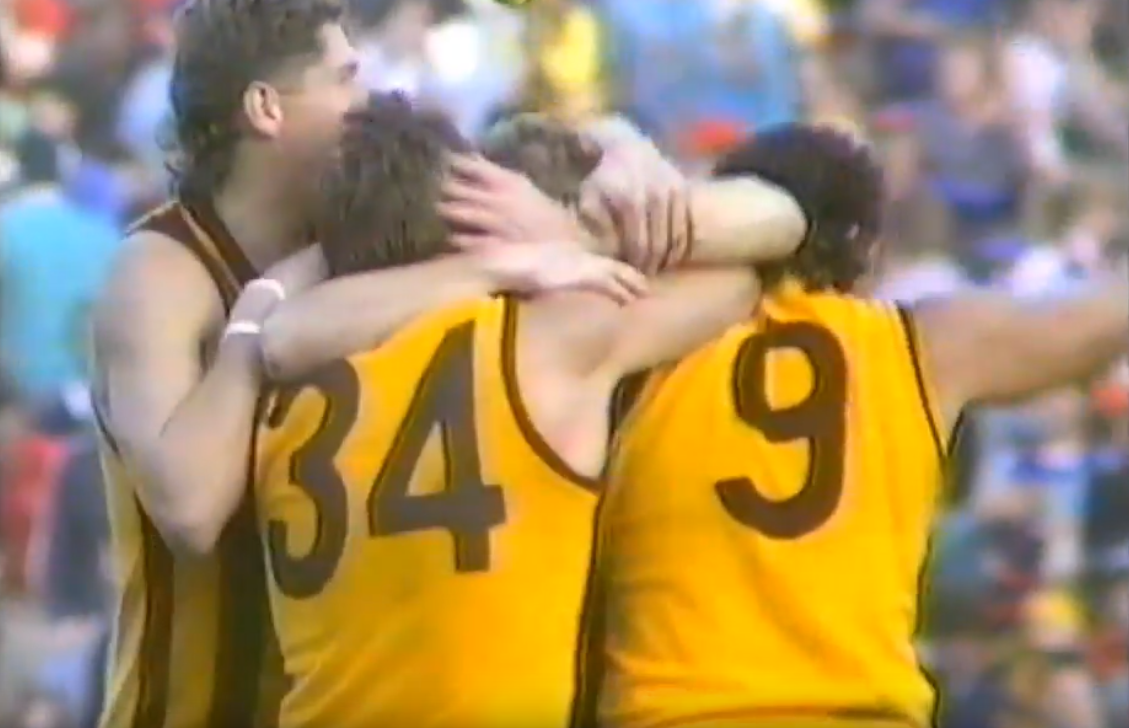
Gary Buckenara is smothered by teammates Ray Jencke, John Kennedy and Robert DiPierdomenico after his post-siren goal. Picture: CHANNEL 7
But the legacies of the 1987 preliminary were more than just a treasure trove of nostalgia. It was a day which, in a broader sense, had some significant consequences for many involved, not to mention the two clubs.
On an individual level, it was Stynes, who was playing in just his 13th game of senior football, who bore the most obvious brunt of the fall-out. Still just 21, the young Irishman headed off to Europe to escape the innumerable post-mortems on his infamous part on football history.
On the Metro in Paris, a man drew towards him and asked: “Aren’t you the bloke who ran across the mark in the preliminary final?” At that point, Stynes knew he’d never completely escape what had happened.
But in an already fiercely determined young character, the scale of that setback, which might have broken others, was also partly his making.
Stynes would play an incredible 244 consecutive games for the Demons, several times along the way fronting up with injuries that should have seen him sidelined. His mobile, athletic ruckwork effectively changed how the position of ruckman was played. Within four years, Stynes was a Brownlow medallist.
“There was no running, no hiding from the mistake I make against Hawthorn. I could not blame it on this or that,” Stynes wrote in his autobiography “Whatever It Takes”.
Northey’s relationship with his international experiment never suffered as a result of his stinging post-match spray.
“We met in the lift that night and I told him to forget about the things I’d said because they were just absolutely stupid,” he said years later. “’It was just one of those little setbacks that were a great spur to him to improve himself any way he could to reach the top. I don’t think I’ve ever met a more determined fellow in achieving anything he set out to achieve.”
Eishold, meanwhile, is still reminded of his costly shank 30 years on. He’d go on to play another six seasons with Melbourne, finishing with 82 senior games.
“I’ve tried to move on, but there are plenty of people out there who haven’t – and they remind me regularly,” Eishold told the Herald-Sun five years ago on the 25th anniversary of the game. “A lot of people do recall it, and I suppose you become infamous for something, don’t you?
“I nearly got into a blue in the main street of uni the next week when some bloke had a go at me. The boys at uni saw me get a little bit fiery when this bloke bagged me and said it was all my fault.
“I’d actually run from the other end of the ground. I’d smothered the ball at the other end and saved a goal. I was completely exhausted. I did one thing with my leg and the other thing with the ball.”
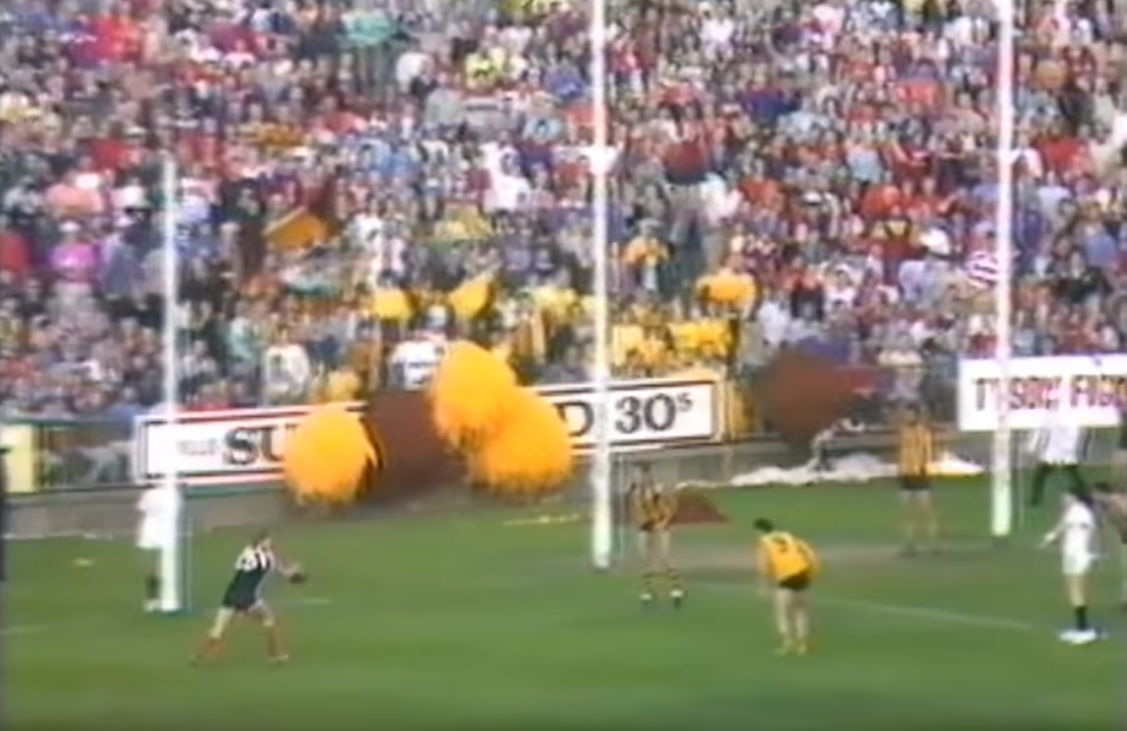
Simon Eishold about to shank his shot for goal in the final minutes. Hawthorn defender Paul Abbott is the man on the mark. Picture: CHANNEL 7
Melbourne was a young side, in racing parlance leading the Grand National then falling at the final hurdle. The experience might have shattered the Demons for good. But it didn’t. Indeed, the heartbreak would have a galvanising impact.
Under Northey, they’d go on to play in the next four finals series, regularly pulling off September victories against more fancied opposition.
Melbourne went one step better the following season, again rising from fifth spot on the ladder. They won a nail-biter against West Coast in the elimination final, in the first semi-final knocked off a Collingwood which had finished three-and-a-games ahead on the ladder, then took their biggest scalp in the preliminary final, reigning premier Carlton.
The grand final would prove a disaster, Melbourne again having the fairytale crushed by Hawthorn, this time by a record 96-point margin. But their timing was unfortunate. The 1988 Hawks were arguably the most complete, powerful and invincible premiership side the modern era of football has seen. Which in itself, was another legacy of the 1987 preliminary final.
Having exhausted all reserves of energy simply to get over the line thanks to Buckenara’s kick, Hawthorn was a sitting duck on grand final day 1987.
Not only were the Hawks spent, they’d also lost spearhead Jason Dunstall with an ankle injury, faced an opponent in Carlton hell-bent on revenge for the previous year’s grand final loss to the Hawks, and confronted one of the hottest grand final days on record with the temperature well into the 30s.
The result was ugly, Carlton comfortable winners by 33 points and the Hawks pushed around literally as well as on the scoreboard. It left the Hawks embarrassed and nursing the unenviable record of three defeats from their last four grand final appearances. And that would drive a team that played with a ruthless intent as well as obvious skill from that moment on.
Dermott Brereton, who had a poor game in the 1987 grand final opposed to eventual Norm Smith medallist David Rhys-Jones, recalls the sense of shame which surrounded the Hawks not only for that 1987 loss, but the sense that they had failed to fly the flag.
“I thought we were the more talented team, but ‘Tucky’ got his mouth smashed in, ‘Dipper’ got bashed and I got belted up,” he told me in 2013. “Allan Jeans, as good a coach as he was, never wanted to have anything untoward said about the team in terms of how they played.”
But Jeans suffered a serious brain injury at the end of that year and was replaced for 1988 by then football manager Alan Joyce. The mindset changed.
“In 1988, we had a brutal team on a mission,” Brereton said. “Joyce came in and he gave us scope to be brutal. He let us play kind of outside the line of what was fair as long as we didn’t get caught.
“In 1988, we were physically over and above everyone else in the competition. We could have just gone through and played footy, but there was a feeling we had to be physically dominant.
“You would see blokes get off the bus from opposition teams and they’d avert their eyes and you just knew you already had them. There wasn’t a day out of the 365 that led from the 1987 grand final to the 1988 one where I didn’t think we were going to win it. It was the most foregone conclusion to a grand final ever.”
If that sounds arrogant, Hawthorn, driven by the fool’s gold that the great escape from the 1987 preliminary final presented, certainly learned how to back it up.
The Hawks would win back-to-back premierships in 1989 for the first time in their history, win another flag for good measure in 1991, and end up playing in a ridiculous 13 consecutive finals series.
Yes, Melbourne is still waiting for its first premiership since 1964, but the 1987 finals campaign and that memorable near-miss launched a run of sustained success – five straight years of finals – which the Demons haven’t come near any other time in that 43-year period.
The 1987 preliminary final remains etched in football folklore. But its ramifications would be far more profound than just a nostalgic 30 minutes or so on a “Footy Flashbacks” TV program.

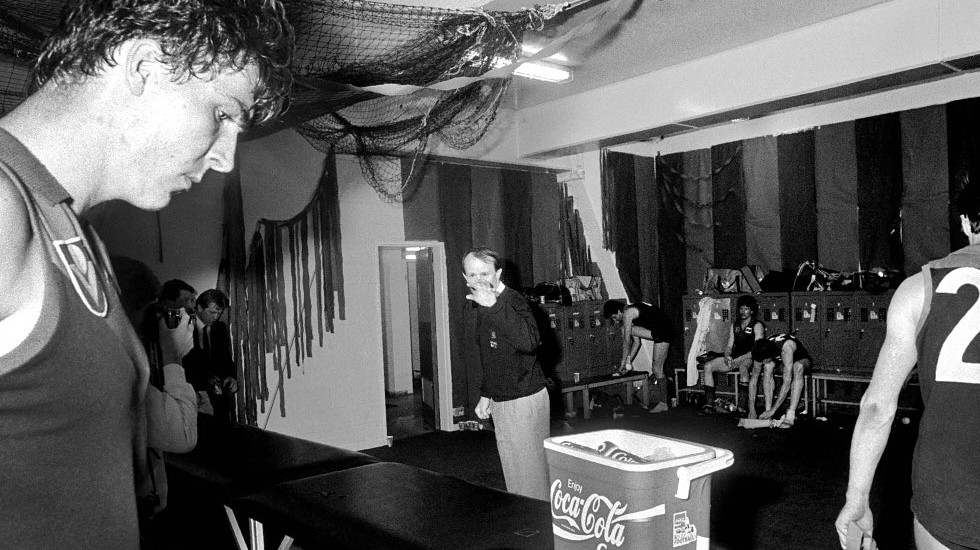

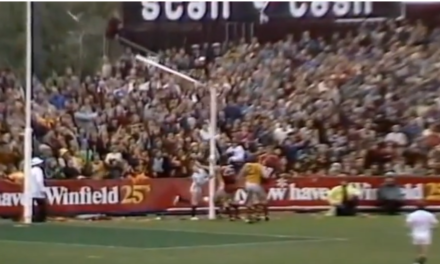
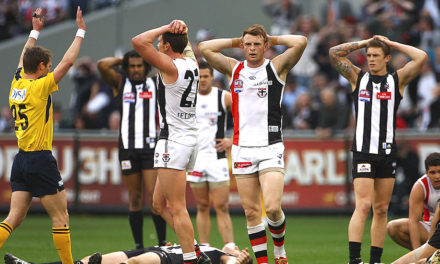
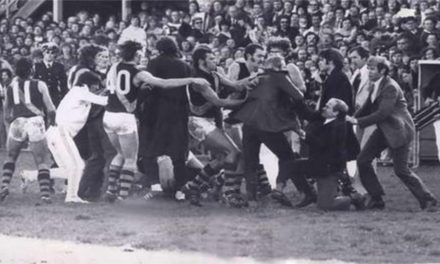






It is really worth noting that Melbourne would surely have been smashed by a huge margin had they beaten the Hawks. Without Flower, and physically exhausted, Carlton’s superb man-on-man defence would have demolished the exhausted Demons in the hot conditions of Grand Final Day.
The way Carlton had been playing since their near-perfect second-half display against the Swans in Round 19 – probably the best team performance I have ever seen in full – Melbourne would have been smashed as North Adelaide were to be by a viciously brutal Port Adelaide in the 1989 SANFL Grand Final. Hawthorn did do well to stay with the Blues for most of the actual 1987 Grand Final, but the Blues always had the edge and run away in the last 45 minutes.
In fact, at the beginning of 1988 Carlton looked almost invincible. The Blues won their first four games, three against quality opposition, in similar conditions to the 1987 Grand Final, and looked almost invincible, especially given they would not have to play Hawthorn again until the finals. However, Collingwood, emulating their man-on-man defence that had smashed opposition attacks in August and September 1987, showed the Blues could be toppled in Round 5. Then, the weather broke up, and under the heavy conditions that prevalied for a large part of the remainder of 1988 the Blues’ man-on-man marking style did not work nearly as well.
At the same time, Carlton had a run of long-term injuries to key players, and meanwhile Hawthorn’s more attacking long-kicking style proved almost unbeatable when the wetter and heavier grounds came. By June, it was clear that Hawthorn’s 1988 team was the greatest wet-weather football machine the game has ever known, and the Hawks were virtually unbeatable once the weather had broken up.
It had one other impact, a 9 year old me watched the 87 GF in England knowing I was emigrating to Australia in 3 months time. For some reason it was in black and white on Englands version of SBS (Channel 4) and I thought Hawthorn had better jerseys so chose them as my team, only to get to Australia see them in colour and see id chosen poo and wee colours!!!
Still though it meant j got the joy of being a Hawks can rather than the pain of being a Demons fan or shame of being a blues can the last 30 years 🙂
Beautifully captured Rohan. As a young Demon supporter in ”87, we rode an unimaginable euphoric wave, the elimination and semi finals left us in a dreamstate, thinking anything was possible. I suspect a few tigers would know something about that at the moment. https://theinternetatemyblog.wordpress.com/
Keep up the good work.